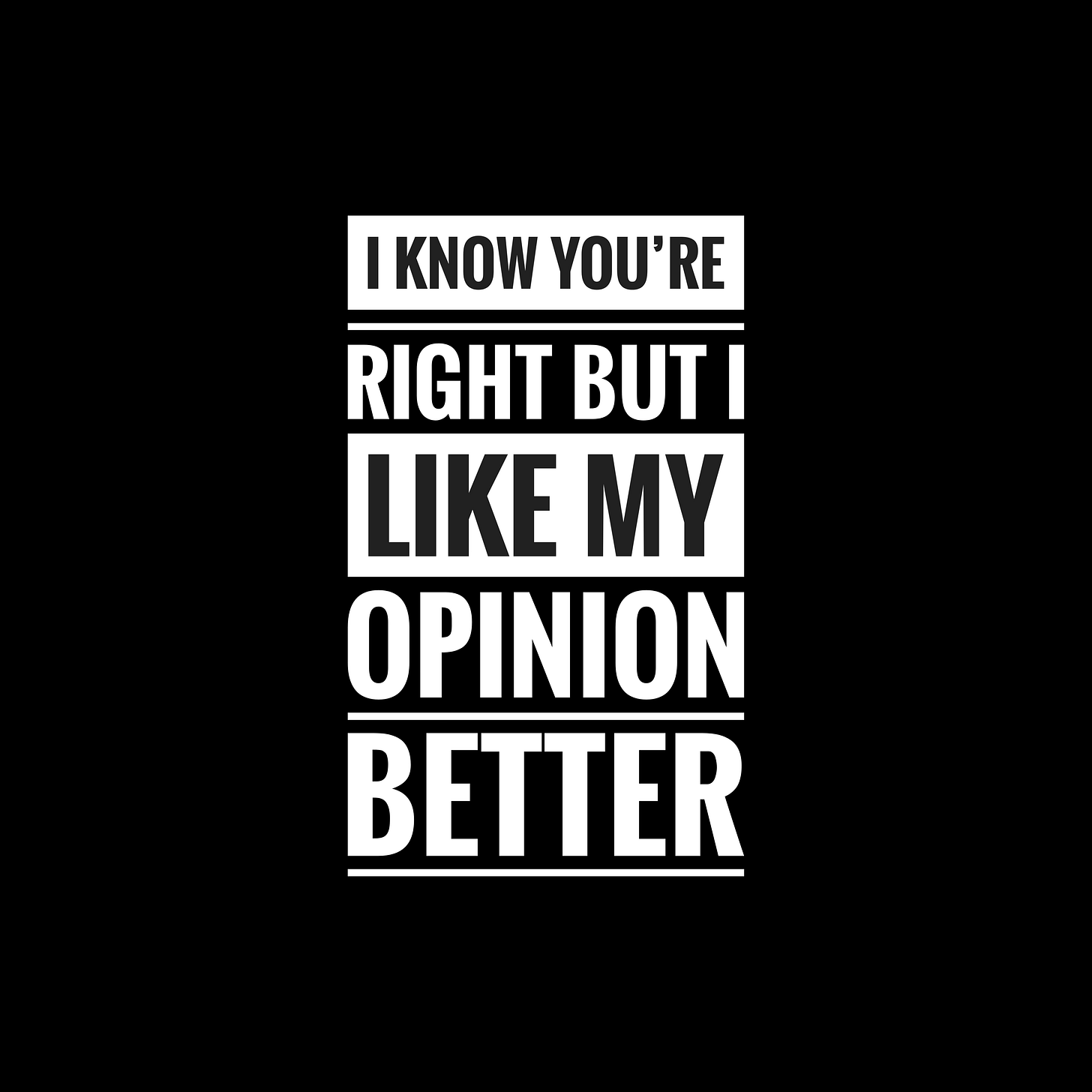That’s just your opinion. Let’s agree to disagree.
You have your truth, and I have mine. How did everything get reduced to relative opinions when you might still think there is such a thing as truth and that truth matters?
And we now have something more pernicious.
How dare you attack me with your thoughts and beliefs? I am hurt and offended!
Do you remember this rhyme?
Sticks and stones may break my bones. But words shall never hurt me.
Violence used to be understood as primarily physical. But now, we live in a world where not only words but beliefs and even thoughts are deemed to be acts of violence. Even silence is now violence. How did we get here, and how can we climb out of your opinion vs mine and thoughts-are-violence quagmire to maintain a grasp on reality?
There are whole cultural and psychological processes to explain why we have ended up where we are (we will get to some of those). But for this post, let’s look at the nature of bad arguments.
Underneath the forces of societal change and cognitive bias is the issue of how any claims and arguments are made. Bad arguments have always been made in history, and this moment is replete with them. So what is a good and what is a bad argument, and why?
I will draw on some insight from Matthew Petrusek on how we can do that.
Facts are not opinions, but isn’t that just an opinion?
If you believe there are such things as facts that are different to opinions, step away from the person who does not. You can’t sort that person out, but you can better understand how facts and opinions work and why people’s opinions might be just that - opinions. And maybe you might feel less crazy about things you think and believe. Of course, you might also realise how your opinions have been caught up in faulty ways of arguing and thinking.
Good parents help their kids learn reality from feelings. No, you can’t eat whatever you want when you want. We know how that approach worked out for us and others in life. My paternal grandfather thought he could eat fried food every day, smoke non-stop, never exercise, and drink a lot until that caught up with him with an early death. My dad thought he could do the same, with similar results.
But I really want to, and need to eat chocolate for all my meals, it’s not fair!
Welcome to life, kids; life is not fair. No matter how many people try to deny biology, biology is a reality. And yes, I will unpack that more in later posts, but I will note for now that you cannot change your sex no matter how much you feel, believe, and want to. I don’t usually reach for atheists to quote, but Richard Dawkins, one of the world’s leading biologists, got into trouble daring to assert that a person’s Sex cannot be changed. Your sex is not assigned by anyone but given and determined at conception. But what does he know? That’s just his opinion.
The Argument About Arguments
Buckle up; here comes the thoughtful bit about how arguments are made and the parts that make them up.
Our minds have three ways of acting/thinking and three related modes of expression (hey, they do lots more than this, but we have to start somewhere):
understanding that relates to terms
judging that relates to propositions
arguments that relate to reasoning, i.e. judgments with understanding, make an argument
Lost already? Bear with me. Let’s explore this with an example of a good argument.
Proposition 1: All humans are mortal
Proposition 2: Jason is a human
Conclusion (argument): Therefore, Jason is mortal
If we understand the terms, i.e. what the words mortal and human as a biological creature mean, and that Jason is a biological human, the conclusion, i.e. argument, follows from the propositions. There is no other way to come to a different conclusion. We can argue and reason from the premise (proposition) that Jason is human.
Yes, but he doesn't feel or act like he is human, you might still think.
That leads us to things about being human beyond biology and a whole different set of arguments about human behaviour and psychology.
Ok, maybe an example of a bad argument will help illustrate things more.
Proposition 1: All humans are mortal
Proposition 2: Jason is a human
Conclusion (argument): Therefore, Jason is the greatest human who has ever lived
Well, we all know that is not true. My wife will attest to that. The conclusion does not logically follow from the premises/propositions that Jason is the greatest human being who has ever lived. This is called a non sequitur, Latin for ‘it does not follow’.
Deep breath.
Really large-scale bad arguments
Let’s try to get our heads around things with a more contemporary example than my humanity:
Proposition 1: No one should be held back in life and work due to an immutable characteristic (race, sex, disability, religion, age, et cetera)
Proposition 2: Some of the most awful systemic racism and sexism in history were made by white men
Conclusion (argument): Therefore, all white men now are intrinsically and irredeemably prone to racism and patriarchal behaviours.
Now this is a non-sequitur.
Proposition #1 is a truth those of you reading would likely assert. Proposition #2 can be shown to be valid from examples in history. However, the argument that all white men now are prone to perpetuate racism and sexism does not follow. We can see that many white men in history were not patriarchal racists, nor are they now. Moreover, this type of argument draws on faulty propositions and understandings from social theories, which are often a sleight of hand, where social theories are claimed to be social reality - and they are not, but sometimes are (we will get to that in later posts, but for now, see Cynical Theories).
But you might notice that as I make my arguments and claim, you feel the weight of the non-sequitur of culture upon you, especially if you are a white male. White men like me claiming a non-sequitur argument about being white and male are told they do so because they are white and male - QED. No reasoning for how my argument might be faulty is required. This is an example of another form of faulty argument, called circular reasoning, where the reasoner begins with what they are trying to end with. It’s a little like the logic of proving someone was a witch. If you drown, you are not a witch; if you float, you are.
Now, a different version of the argument above about race and gender is, I believe, more correct.
Proposition 1: No one should be held back in life and work due to an immutable characteristic (race, sex, disability, religion, age, et cetera)
Proposition 2: Some of the most awful systemic racism and sexism in history were made by white men
Conclusion (argument): White men would benefit from understanding this and exploring why that was how it affected people in the past and how it affects them now.
That does seem to follow.
Summing it all up
Facts and opinions are not the same things, no matter how much people claim they are
There are many reasons we have arrived at the place where feelings trump facts (and we will get to more of those reasons later)
One of those reasons is the nature of faulty, i.e. bad arguments
One of the most persistent faulty ways people argue is with a non-sequitur
If you did not already know it, you just learned some Latin
Extras
If you found this helpful and want to ensure you don’t miss other articles, subscribe with your email. If the above was no help at all, subscribe and see if later articles help you more.





